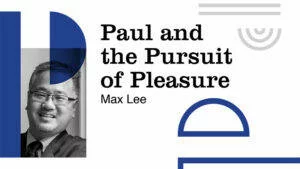Our relationship to pleasure has been tormented since the serpent appeared in Eden, right after the repeated affirmation of the goodness of creation. How are we to look at trees that are good for food, a delight to the eyes, and desired to make one wise? Such trees lie in the midst of paradise, always offering their fruit before us. In Book IX of Milton’s Paradise Lost, Eve muses to herself:
Here grows the Cure of all, this Fruit Divine,
Fair to the Eye, inviting to the Taste,
Of vertue to make wise: what hinders then
To reach, and feed at once both Bodie and Mind?
So the mother of all living “took of its fruit and ate, and she also gave some to her husband who was with her, and he ate” (Gen 3:6). How, then, should we think of natural desire this side of the fall? Does it offer any help in our effort to discern what is morally good?
According to incoming Henry Fellow Max Lee, Professor of New Testament at North Park Theological Seminary, “a theory of pleasure can provide a basis for an ethics of pleasure by which we engage pleasure holistically.”How, then, should we think of natural desire this side of the fall? And he thinks there is a lacuna in theological scholarship when it comes to developing a theory of pleasure. His research project for the 2020–2021 academic year titled Natural Desire as a Moral Index of What is Good, attempts to fill that void. This interdisciplinary project examines what Paul and the Epicureans have to say about the orders of pleasure, and it brings these philosophical, biblical, and theological discussions into conversation with neurobiology, cognitive science, and experiential psychology in order to explore “the potential and limits of natural desire and our embodied human response to outside stimuli as a means to gauge what is beneficial and harmful.” There is a particular need for reflection about natural desire that integrates the health sciences and Christian theology, which will serve as a basis for our thinking about pleasure more broadly. Lee’s project during his time as a Henry Fellow will serve to meet this need, aided by the other scholars working with the Creation Project.
Paul and the Epicureans on Natural Desire
Things like “food, drink, human intimacy and friendship, leisure, and play are physical and social pleasures which are also good gifts from our Creator,” Lee reminds us. But he also recognizes that they can be “dangerously idolatrous and addictive.” Such it is that our relationship to physical pleasures is tense at times, precarious even, as we try to discern the line between the right enjoyment of God’s good gifts on the one hand, and hedonistic idolatry on the other. In 1 Corinthians, Paul provides moral instruction on how best to consume pleasurable goods in a way that leads to human flourishing. The Epicureans, similarly, practiced a kind of moral naturalism where satisfying natural desires for food, sex, wine, and other bodily pleasures was seen as morally good as long as it did not cause pain. Lee, then, wants to bring these theories of pleasure into conversation in his project examining “the issues of food consumption (1 Cor. 8:1–13; 10:23–30), sexual pleasure (6:12–20), and entertainment (15:12–58) in the ancient dialogue and debate between the Apostle Paul and the group which New Testament scholarship has called ‘the Corinthian strong’ or ‘the Corinthian wise.’”
According to Lee, popular caricatures of the Epicureans as gross hedonists misses the mark. Rather, their brand of hedonism was self-controlled, pragmatic, and culturally influential.See, e. g., Voula Tsouna, The Ethics of Philodemus (Oxford: Oxford University Press, 2007); James Warren, The Pleasures of Reason in Plato, Aristotle, and the Hellenistic Hedonists (Cambridge: Cambridge University Press, 2014). In fact, Paul shares more in common with the Epicureans than might be expected. Joel Green, for instance, has shown that both Paul and the Epicureans affirm that the body matters.Joel Green, Body, Soul, and Human Life (Grand Rapids, MI: Baker Academic, 2008). Further, Lee thinks that Paul finds much common ground with the Epicureans concerning food consumption, and perhaps even in matters related to sex and entertainment. He says, however, “while Paul does believe that natural desire and aversion can function as an epistemological index for assessing what is good and can act as a means of moral valuation, he is also aware of how dangerously overpowering and idolatrous desire can become.” Thus, 1 Corinthians shows Paul’s convictions about how the church should understand pleasure, and Lee’s reading of it in conversation with the Epicureans will shine more light on the ways that it might serve as an indicator of what is good and true.
Natural Pleasure, Moral Pleasure
This year of the Creation Project will focus on uniting the natural and moral order. On this count, Lee believes that “natural order can be an indicator of moral order, but moral order finds its ultimate standard in divine revelation as recorded by Scripture and in the redemptive work of the triune God throughout human history.”“My work contributes to the ministry of the church because a Christian theory of pleasure can inform believers how they can enjoy God’s created goods as a means of participating in the life of the triune God.” So he will offer his expertise as a New Testament scholar in the collaborative environment of the Henry Fellowship in order to bring more clarity to the question of what it means to affirm the enduring goodness of creation. “What excites me about my vocational call as a biblical scholar is to engage history, exegesis, theology and intercultural hermeneutics in non-competitive ways so the sum of my work informs the church’s proclamation of the gospel and its ministry to the wider world.” Lee’s aim in particular is to help the church think about how pleasure can help us discern the good of God’s world, examining the ways in which embodied human experience may be an arbitrator of what is true and moral.
In a world stuffed to the brim with consumer goods, Lee senses the need for theological reflection on material pleasures. “I fear that the church as a whole engages pleasure no differently than the secular world. My work contributes to the ministry of the church because a Christian theory of pleasure can inform believers how they as individuals and as a faith community can enjoy God’s created goods as a means of participating in the life of the triune God.” The right response to the plethora of material goods ready at hand cannot be a strict asceticism; rather, we must find a way to engage God’s creation with a redemptive framework. “I hope that more Christians, especially within the evangelical landscape, will understand that pleasure and discipline work in tandem with one another as a sacred space within which the Christ follower lives.”
Lee’s project on pleasure is wide-ranging, taking into account complex things such as medical studies on trauma, the problem of eating disorders, the psychology of addiction, and the brain chemistry of spiritual mimesis. These various threads will come into the conversation that Paul is having with the Epicureans in Lee’s reading of 1 Corinthians. Taken together, the project will result in an interdisciplinary book on a theory of pleasure, which will help us think rightly about natural desire this side of the fall. We look forward to welcoming Max Lee to the Henry Center, and are eager to support his research as he provides the church with a theology and theory of pleasure so we can better enjoy the good gifts of our Creator, not as idols, but expressions of grace.
2020–2021 Henry Resident Fellows
 |
Joshua W. Jipp Associate Professor of New Testament, Trinity Evangelical Divinity School Project: “Paul and the Pursuit of Happiness” |
 |
Kevin Kinghorn Professor of Philosophy and Religion, Asbury Theological Seminary Project: “Rethinking Our Moral Intuitions” |
 |
Max Lee Associate Professor of New Testament, North Park Theological Seminary Project: “Natural Desire as a Moral Index of What Is Good” |
 |
Alexander C. Stewart PhD, McMaster Divinity College Project: “Wired for Wonder: Natural Awe in the Sciences and Scriptures” |







Comments
Be the first one to make a comment!